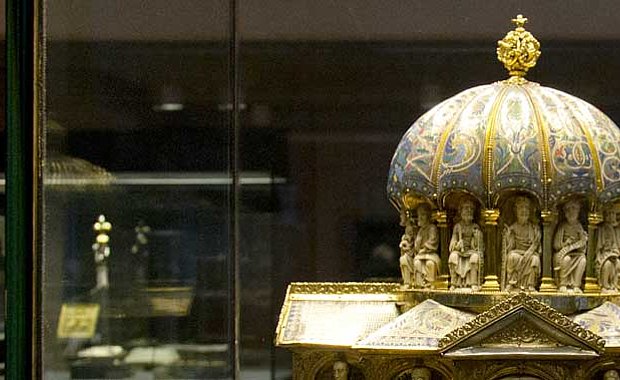Restitution of the Guelph Treasure was first requested in 2008 by heirs to some of the Jewish art dealers in the consortium. The Beratende Kommission (Advisory Commission) concluded in 2014 that there was no basis for such restitution. Several of these heirs filed a lawsuit with the U.S. District Court in Washington, D.C., in 2015.
In 2008, several individuals (who claim to be heirs of some of the art dealers who sold the Guelph Treasure to the Prussian State in 1935) asked for restitution of the collection. SPK conducted detailed scholarly research into the circumstances of the 1935 sale and concluded that the conditions for restitution were not met. The sale is a very distinct and singular case with a unique set of facts behind it. It does not qualify as a forced sale due to Nazi persecution, although the sellers included Jews living in Germany and abroad. The following historical facts, which have been verified by source materials, support this determination:
- The purchase price paid was a market price during the Great Depression that followed the U.S. stock market crash of 1929.
- The sellers received the agreed purchase price in the form of cash and rare works of art, and no restrictions were placed on how they could use these proceeds.
- Since 1930, the Guelph Treasure had been located outside Germany, and the German state had no access to it at any time during the sales negotiations.
The Advisory Commission in 2014: No restitution required
Since an amicable agreement with the original claimants was not possible, they and SPK agreed to bring the matter before the Beratende Kommission (Advisory Commission) in 2012. The Advisory Commission, then chaired by Prof. Jutta Limbach (+), the former President of the Federal Constitutional Court of Germany, was established by the German government in 2003 to help resolve such restitution claims.
After reviewing materials presented by the claimants and SPK and conducting a hearing, the Advisory Commission concluded in March 2014 that there was no evidence of a forced sale of the Guelph Treasure in 1935 due to Nazi persecution, and therefore the Commission could not recommend the collection’s return to the claimants or any previous co-owners. In advance of the Advisory Commission’s ruling, the original claimants and SPK had indicated that they would accept the Commission’s decision, effectively closing the case.
2015: A lawsuit is filed in the USA
On February 24, 2015, two of the original claimants filed a lawsuit in the United States District Court for the District of Columbia in Washington, D.C. (Philipp and Stiebel vs. Federal Republic of Germany and Stiftung Preußischer Kulturbesitz), seeking restitution of the Guelph Treasure.
In the United States, before a defendant presents its view of the case or responds to the substance of a suit, it must file a motion to dismiss if it believes that the court lacks jurisdiction over the dispute or that it has been filed in the wrong venue. For the purpose of assessing the admissibility of the suit on jurisdictional grounds, the court must disregard the legal merits of the suit and assume that of all the plaintiffs’ allegations are true.
The question of U.S. court jurisdiction
SPK believes the Guelph Treasure case should not be heard in a U.S. court and therefore filed a motion to dismiss the case in 2016. After the court ruled on March 31, 2017 that the case could proceed, SPK filed an appeal with the U.S. Court of Appeals for the District of Columbia Circuit. A three-judge panel of the D.C. Circuit denied SPK’s appeal in July, 2018. SPK requested en banc (full court) review in September of that year. The request for en banc review was denied on June 18, 2019, with one U.S. Court of Appeals judge issuing a dissenting opinion.
On September 18, 2019, SPK filed a petition with the U.S. Supreme Court (SCOTUS) asking it to review the appellate court decision that denied SPK’s motion to dismiss the lawsuit. SCOTUS asked the U.S. Solicitor General to offer its view on the legal issues SPK raised in its request for SCOTUS review. In its brief filed on May 26, 2020, the Solicitor General expressly urged SCOTUS to support SPK’s request and reconsider and overturn the lower court’s 2017 ruling against SPK.
Recommendation of the Advisory Commission
“The Advisory Commission […] is of the opinion that the sale of the Welfenschatz was not a compulsory sale due to persecution. It cannot therefore recommend the return of the Welfenschatz to the heirs of the four art dealers and any other previous co-owners.”
Recommendation of the Advisory Commission (“Guelph Treasure”)
